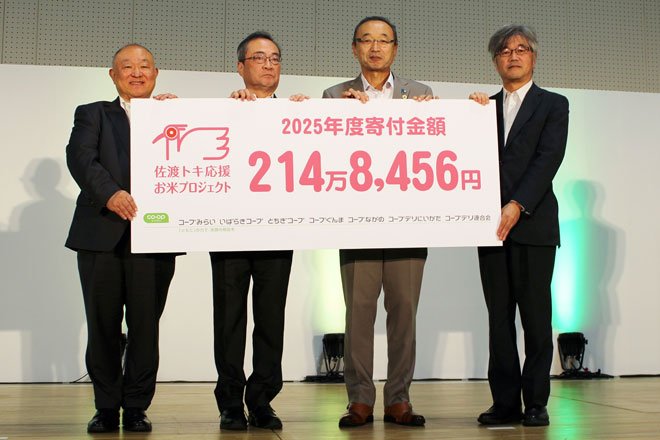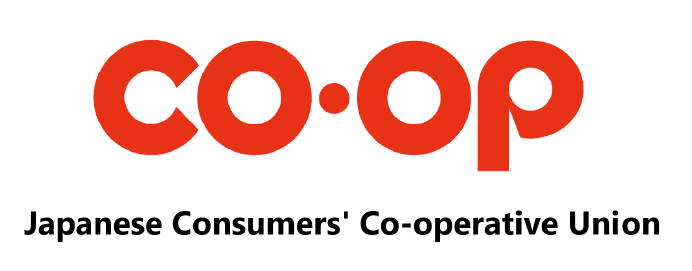JCCU announces the business results for the first half of FY2021. It also reports on the progress of the DX-CO-OP Project, a cross-sectional initiative of Japanese consumer co-ops.
Community-based consumer co-ops:
The total turnover of major community-based consumer co-ops nationwide is growing compared to pre-COVID-19 levels.
JCCU reported that the total sales turnover of 65 major community-based consumer co-ops nationwide in September was 244.7 billion yen (101.6% of the same month in 2020). Although there was a rebound in demand due to the first State of Emergency declared in April, the sales in September exceeded that of the same month in 2020. In addition, compared to 2019, the year before the spread of COVID-19, the rate of growth is increasing at 111.5%.
The trend of sales turnover (%) in the first half of 2021 (April to September) for the major community-based consumer co-ops nationwide compared to 2020
|
|
April
|
May
|
June
|
July
|
August
|
April to August
|
|
September compared to 2020
|
September compared to 2019
|
|
Total sales
turnover(1+2+3)
|
97.7
|
93.1
|
99.6
|
99.3
|
98.8
|
97.7
|
|
101.6
|
111.5
|
|
1. Store sales
|
91.0
|
93.9
|
98.6
|
96.5
|
97.7
|
95.5
|
|
101.5
|
105.0
|
|
2. Delivery
sales
|
101.3
|
92.4
|
100.0
|
100.5
|
99.2
|
98.6
|
|
101.6
|
115.6
|
|
Individual home delivery
|
103.3
|
93.0
|
101.0
|
102.1
|
100.7
|
100.0
|
|
102.8
|
120.4
|
|
3. Other
sales
|
101.4
|
108.2
|
105.1
|
104.1
|
108.5
|
105.3
|
|
101.8
|
96.8
|
※The figures from April to August are fixed values.
※Figures for September are preliminary.
Home delivery business:
First-half sales turnover: 99.2% compared to 2020, 116.9% of the same period in 2019. Frozen foods performed well due to the increased number of hours spent at home.
In the first half (March 21-September 20), the home delivery business turnover was 99.2% compared to 2020 and 116.9% of the same period in 2019.
In May 2021, there was a rebound in demand for home delivery due to the declaration of the first State of Emergency last year, but the demand has been steady since June. September turnover was 101.6% compared to 2020 and 115.6% compared to 2019 in a single month. Frozen foods, including prepared cold foods (especially noodles, rice, livestock, and side dishes) continued to perform well, probably because of the increased time spent at home.
Store business:
The sales turnover in the first half was 96.3% compared to 2020 and 105.0% compared to the same period in 2019. Ready-to-eat delicatessen continues to perform well.
Store business turnover in the first half (March 21 to September 20) was 96.3% compared to 2020 and 105.0% compared to the same period in 2019. Similar to the home delivery business, there was a year-on-year decline in April and May, but the business has been growing steadily since June. By category, ready-to-eat delicatessen continued to perform well.
The figures for April through August are fixed values, and the figures for September are preliminary figures, implying that the comparison figures are also preliminary.
JCCU's total turnover in the first half of the year remained strong at 221 billion yen (97.8% compared to 2020 and 113.2% compared to 2019).
The total turnover of JCCU for the first half of the year was 221 billion yen (97.8% compared to 2020 and 113.2% compared to 2019). Compared to last year, when demand increased due to the declaration of the State of Emergency, many businesses did not reach the previous year's level due to a rebound, but compared to fiscal 2019, which is before COVID-19, all businesses are performing well, exceeding 100%.
The CO・OP Brand Product Business sales turnover was 173.8 billion yen (98.5% compared to 2020 and 112.2% compared to 2019), due to particularly strong sales of frozen foods (frozen rice noodles and frozen rice), beverages, and processed foods (instant soups).
[Progress of the DX-CO-OP Project]
The DX-CO-OP Project is a cross-sectional initiative by JCCU together with the Co-op Tohoku Sunnet Business Federation (Co-op Tohoku), the Co-opdeli Consumers' Co-operative Union (Co-opdeli), and the Tokai Co-op Business Federation (Tokai Co-op) to realize a new lifestyle for co-op members.
From April 2021, the three concepts and specific measures formulated to promote this project are being verified by the three federations. Based on the results, the measures that would be confirmed to be successful to all consumer co-ops nationwide will gradually be introduced through JCCU. (
Related article)
Newly developed AI (Artificial Intelligence)-driven system for efficient distribution of home delivery catalogs contributes to improved usability, reduced environmental impact, and cost reduction.
The background of establishing the system to improve the efficiency of home delivery catalog distribution
The home delivery catalogs offered by consumer co-ops nationwide have on average about 10 to 30 pages every week, including those that list clothing and miscellaneous goods in addition to groceries. (The number differs depending on the co-op.)
Until now, consumer co-ops have focused on providing the same information to their members equally, but in response to members comments such as "we don't need unnecessary catalogs" and "it would be better to be environmentally conscious and save paper," the co-ops have decided to build a new system for "efficient distribution of home delivery catalogs," in which AI is employed to make a comprehensive evaluation based on past order histories to determine whether or not to distribute catalogs in subsequent deliveries.
Example of home delivery catalogs. About 10 to 30 catalogs are delivered every week.
*The number differs depending on the co-op.
From August 2021, verification was performed at the member co-ops of Co-op Tohoku Sunnet Business Federation, and based on AI predictions, the number of copies of some catalogs distributed was reduced by 50%. Even with this reduction, usage remained in the high 90% range of the previous year's level, confirming the efficient delivery of necessary catalogs to members in required quantities.
We will continue to verify the results and expand the system to offer more efficient distribution of home delivery catalogs to member co-ops nationwide.
Expected Effects
- No more unnecessary catalogs will be delivered and will be easier to use by co-op members.
- Reduction of paper catalogs, thus reducing environmental impact
- Reduction in the number of catalog copies, enabling cost-cutting by co-op
Verification Results
- Verified by Co-op Tohoku in August 2021
- Reduced the number of copies of some catalogs to 50% based on AI predictions
- Utilization remained in the high 90 % range even after reducing the number of people to whom catalogs were distributed by half.
- Demonstrates that it is possible to deliver the necessary catalogs in the necessary quantities









